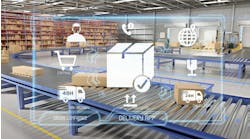As the world becomes more digitized and connected, companies are looking more carefully at the role of their supply chains within their overall operations. Encompassing all entities and activities that are either directly or indirectly serving the same end user, supply chains have become a focal point for organizational change and continuous improvement, both of which are mandatory in today’s digital age.
The question is, what do companies need to do now to shore up their supply chains for the digital onslaught? Here are four steps that experts suggest all companies start taking now:
- Create a single source of data “truth.” Every manufacturer—and each one of their supply chain partners—needs a single source of data truth to survive the massive wave of change that’s hitting from all directions. “In other words,” Steve Rice writes in Will Your Supply Chain Sink or Swim in the Digital Age?, “they need a collaborative digital supply chain platform that can share and extract data between the ERP, WMS, and other connected workflow-specific systems.” He suggests using a platform as a single point of access to all data, and notes that such platforms help to ensure complete accuracy while synchronizing the flow of information among internal stakeholders and suppliers.
- Utilize an efficient, centralized procurement platform. “It doesn’t matter if you’re motivated by new compliance, efficiency, or cost standards, or just trying to gain centralized oversight and control of all supply chain activities and supplier actions,” Rice writes, “look for a solution that (bottom line) enables you to source more strategically without exhausting resources—or suppliers.” The solution should also allow you to take more efficient procurement actions that will subsequently accelerate production timelines, he adds, and achieve the precise level of supplier/inventory predictability needed to execute just-in-time manufacturing.
- Put your customer at the center of the conversation. Within the global supply chain, the logistics and transport networks that companies rely on must be part of their response to disruptive digital transformation. And customers have to be at the center of that conversation “Speed-to-market has taken on a radical new dimension in competitive environments. It’s not just how quickly you can bring a new product from the ideation stage to actual production, but how quickly you can put it in the hands of the customer,” Monica Truelsch writes in Digital Disruption Has Already Hit Your Customers, Can Your Supply Chain Keep Up? “Long lead times result in lost sales, regardless of total price, when your customers can quickly and easily shop competitive availability.”
- Factor sustainability into the equation. Defined as development that meets the needs of the present without compromising the ability of future generations to meet their own needs, sustainability is increasingly seen as a competitive advantage into today’s business world. “As supply chains become increasingly connected we are already seeing how digitization can enable supply chains to be more adaptable and responsive,” writes Cliff Henson in How digital transformation is enabling a resilient and sustainable supply chain. He sees advanced risk prediction tools (e.g., those that incorporate environmental and ethical risk monitoring), and those technologies that help create transparent and collaborative networks, as two key components of the sustainable supply chain. “By weaving sustainability into the fabric of our digital supply chain strategy and leveraging it as a driver of innovation,” Henson writes, “businesses can secure a competitive advantage.”










